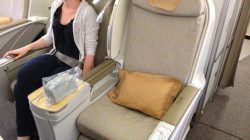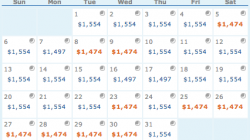A two week honeymoon in southeast Asia for $1,500? That’s impossible with traditional travel and one reason I enjoy collecting miles and points. What frustrates me is that it’s still about $500 more than I wanted to pay.
Update: The honeymoon is now over. You can read the trip report, starting with this post.
I gave some earlier introduction to how I planned our flights, but this is a more technical and thorough post since several readers said they enjoyed it when I describe my thought processes. I’ve written this update now that I’ve revised the flights and also booked the hotels. In addition to explaining how much it cost and where we got the points, I’ll also discuss how I chose among different redemption options. The trip report is still several months away until after our vacation. 😉
Booking the Honeymoon Flights with Miles
- Seattle to Seoul — Asiana business class
- Seoul to Singapore — Singapore Airlines business class
- Singapore to Denpasar (Bali) — Singapore Airlines economy class
- Denpasar to Bangkok — Thai Airways business class
- Bangkok to Phuket — Thai Airways business class
- Phuket to Hong Kong — Thai Airways business class
- Hong Kong to Seoul — Asiana business class
- Seoul to Seattle — Asiana business class
As you can see, it’s pretty much all business class. The one exception is Singapore to Bali in economy class. I don’t mind this because it is only a 2.5 hour flight and it is still Singapore Airlines. 😉 I actually look forward to the opportunity to experience a different cabin class after trying out first and business class last year. All that will be left is Singapore’s Suites Class, a more exclusive version of first class with enclosed pods.
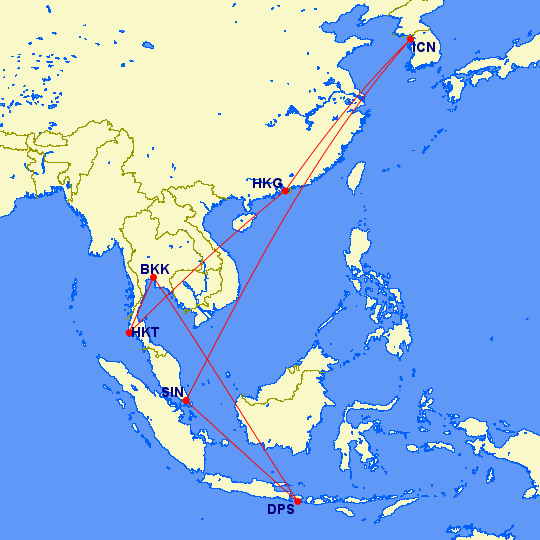
There are no further changes planned for this itinerary unless Singapore Airlines has another glitch with its partner award availability. I could have confirmed business class on the Singapore-Bali leg if we took the later flight arriving around 9 PM, but we would prefer an earlier arrival. For now I have a seat alert with ExpertFlyer.
I’ve also heard rumors that United has relaxed its rules on traveling from North America to Asia via Europe. It’s a nice perk, but they use to require that you fly via Europe in both directions. Apparently we can now fly to Bali over the Atlantic and return over the Pacific. I will hold off on future changes until I find a good first class award, and that is not likely to happen until a few days before departure.
Pricing Award Flights
I originally booked this as a round-trip from Seattle to Bali with a stopover in Bangkok. I then booked a separate ticket from Bangkok to Phuket with a stopover in Hong Kong on the return. Only later did I realize there was no reason to do this since it required flying back from Hong Kong to Bangkok and waiting six hours in the airport for our flight to Seoul. Although that inconvenient Hong Kong-Bangkok segment happened to be in first class on a Thai Airways A380, it wasn’t worth it.
United allows one stopover and two open jaws on round-trip award tickets. I decided to change my stopover in Bangkok to an open jaw. After reaching Bangkok from Bali, we will pick up later in Hong Kong to return to Seattle. Instead leaving early and wasting time in a Bangkok airport lounge, we will get an extra day to spend in Hong Kong. Here’s how the changes worked out: The first itinerary was originally
- SEA-ICN-SIN-DPS (destination)
- DPS-BKK (stopover)
- BKK-ICN-SEA
I changed this to
- SEA-ICN-SIN-DPS (destination)
- DPS-BKK (open jaw)
- HKG-ICN-SEA
Much more sensible, and I actually saved about $16 in taxes despite no changes in the miles redeemed. I also eliminated BKK-ICN, which had been in economy class.
Tip #1: Understanding where your destination and open jaws or stopovers are located can help make or break your pricing strategy. When we visited Singapore and Hong Kong last year, the agent originally charged us for first class in both directions even though Hong Kong to San Francisco was booked in business class. I explained that Hong Kong was the destination and Singapore, which we visited first, was the stopover. This allowed us to pay for first class on the outbound and business class for the return.
Back to the honeymoon… I then cancelled the second itinerary, which had been a round trip from Bangkok to Phuket with a stopover in Hong Kong, and just booked two one-way flights in business class from Bangkok to Phuket and Phuket to Hong Kong. This saved 25,000 miles and $64 since we no longer had the first class leg returning from Hong Kong back to Bangkok.
Tip #2: This change was royal pain to sort out because the didn’t double check her work and the computer continued to price it as a round-trip award with one leg in first class. The second agent was very apologetic when she correctly re-priced it, bringing in a second person to get it done quickly. Always check your receipts and account summary!
The total cost for two people was 310,000 United miles and $190 in taxes and fees. The miles are worth $6,200 at my standard valuation of 2 cpm, or $3,100 per person. This compares to $8,356 per person if we booked revenue flights on the same itinerary. Even the cost of the miles seems a bit high, but it is a two week trip and allows unlimited changes thanks to my elite status. Booking first class awards is a better value, but we did not find any available space.
Where did we get 310,000 miles? Well, I fly 100,000 miles a year on United as a Premier 1K, so with my 100% elite bonus I earned 200,000 redeemable miles right there. I got the remaining miles by transferring Ultimate Rewards points. Megan and I each opened a Sapphire Preferred card, and I opened an Ink Bold business card. Chase did close my Sapphire Preferred card because of those transfers since Megan isn’t technically my spouse yet, so this might not be the best strategy for consolidating miles for a honeymoon. Still, the points from her card were a small contribution to the total.
Booking the Honeymoon Hotels with Points
We will be staying five nights in Bali, two nights in Bangkok, four nights in Phuket, and three nights in Hong Kong. We’ve already been to Hong Kong, and Megan isn’t especially keen on Bangkok (she wants the beaches). But I need my city time. Two weeks on a beach would bore me to death, and I think Megan will enjoy seeing at least some of Bangkok. This itinerary is a good compromise for both our needs.
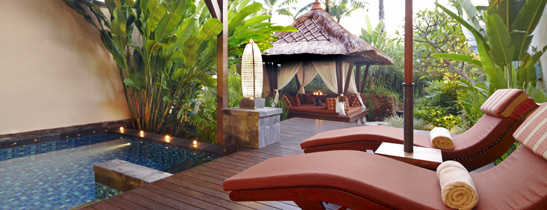
Many people told us to go to the St. Regis Bali. I’ll try out something more local the next time, but it seems like a good time to splurge. I stayed at Le Meridien Bangkok the last time I was there and am excited to compare it to the Grand Hyatt, especially as it will be on the tail end of its current renovation. Our stay in Hong Kong last year at the Grand Hyatt was wonderful, but we need to burn some Hilton points so the Conrad is the obvious choice. The only real decision we had to make was where to stay in Phuket. Eventually I settled on the Westin over Le Meridien (Hyatt doesn’t have a property) after reading several reviews of each.
Pricing Hotel Awards
Our hotel costs are going to be more than I originally expected because points redemptions don’t make sense in some cases and because I didn’t have enough points in other cases. There is a key difference in my experience between hotel and airline loyalty programs. While hotel programs have few blackout dates and offer easier entry to the casual traveler, they are not always very lucrative.
Even if you wanted to burn your points on a place like the Park Hyatt Maldives, you have to get there first. If you don’t have points you can book with an online travel agency or from Priceline or Hotwire, and hey, you’re still at the Maldives! Airline programs offer significant value on international awards in premium cabins — exactly the sort that most people cannot afford and which are desperately needed on long-haul journeys. The catch is that award space can be hard to find. So when planning a trip, I let the airline’s award space guide my choice of destination and then book hotels.
St. Regis Bali and Westin Siray Bay
We will be splurging on five nights at the St. Regis Bali, a property with limited SPG participation. The price of a free night in the SPG program, normally 9,000 t0 15,000 points at most nice hotels, skyrockets to 25,000 points in Category 7.
But because all rooms here are suites or villas, the rate is actually even higher. Taking into account our fifth free night, we were offered a choice between 126,000 points for a St. Regis suite or 130,000 points for an upgrade to a suite with a plunge pool. I found myself short and had to decide between cash and points or buying the points I needed for a full award stay.
I ended up spending $420 to buy the remaining points, and I also booked a cash and points award for the Westin Siray Bay in Phuket before the recent award chart changes went into effect. Total cost: $420 for points and about $280 for the cash portion in Phuket. $700 is not a bad price for nine nights. But I also redeemed 135,000 Starpoints, which I value at 2.5 cents each, or $3,375 total. The St. Regis normally costs about $600 a night, so I think I have a fair award here — not great, just fair. I’m happy with that because we had more points than cash.
We got these points from the personal SPG American Express cards Megan and I opened as well as my business SPG American Express card when the sign-up bonuses were temporarily raised to 30,000 points. The extra 45,000 points were earned from spend (15,000), reader referrals (25,000 — thank you!), and hotel stays (5,000 left after several redemptions).
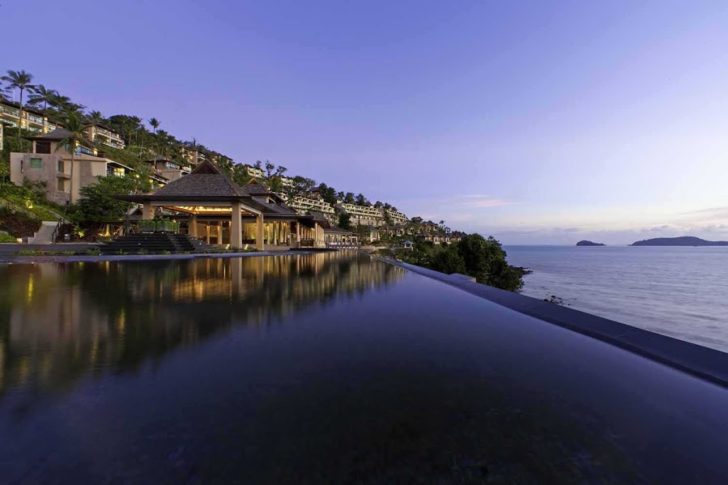
Grand Hyatt Erawan Bangkok
In Bangkok, we booked two nights at the Grand Hyatt Erawan for $220 a night. The hotel will be finishing up renovations in October, but we don’t expect to spend all our time indoors so this won’t be a serious problem. If anything we hope to be among the first to experience the new digs. We reserved a refundable rate in anticipation of some promotional rates, and if those don’t materialize I will change it to an advance purchase rate.
I didn’t bother with a breakfast rate since my Diamond status provides it for us. I chose not to use points because booking suites on an award is relatively expensive with Hyatt, and this hotel is relatively cheap already. On a paid night I can use a suite upgrade and get credit toward my renewing my Diamond status. I qualify each year on stays, not nights, and this visit will be a short one that fits the bill nicely. On a longer stay I might have booked some nights with points and others with cash.
Conrad Hong Kong
Finally, my transfer from HawaiianMiles to Hilton HHonors came through in just one week, so I booked three nights at the Conrad Hong Kong to drain my account before the program became devalued. Good riddance. It cost us only 50,000 points per night, but under the new chart the price would increase to 80,000 points.

These points cost us about $160 from two Hawaiian Airlines credit card annual fees (each provides 35,000 miles, transferable to 70,000 Hilton HHonors points). This deserves inclusion in our budget since we got the cards specifically for the Hilton points. The other points and miles earned above came either through sign-up bonuses with no annual fee the first year or through travel that fulfilled other needs. I was surprised during booking to see my Gold status still runs through 2014; I’ve only ever earned it through promos (like this one through May 31) and credit cards and rarely paid it much thought. But it will get us free breakfast, and it just might get us an upgrade to a room with a better view. However, a view is not important to us at this hotel since we already enjoyed the Grand Hyatt’s spectacular waterfront location.
Summary
In total we’ll spend about $1,300 for 13 nights at some truly amazing hotels, an average of $100 a night. Add the taxes on our flights and it rounds off to $1,500. Most of those nights will be in suites, and most of the flights will be in premium cabins. I estimate that paying for all this at market rates would come in at close to $24,000.
Being flexible helps. I have balances in several accounts so I didn’t need to rely on one for the entire trip. But the real lesson (as I bring up in almost every post on strategy) is to plan in advance. I could have shifted some of my purchases to my American Express SPG card, but I didn’t. I’ve been using my Hyatt and United cards for a variety of reasons even though I don’t find myself in need of Hyatt points or United miles. Heck, I still have Ultimate Rewards points in reserve if I needed to transfer to either of those programs.
In contrast, I could transfer Membership Rewards points to build up my Starpoints balance, but the transfer ratio is an unfavorable 3 to 1. I could have also paid cash for some Starwood nights earlier this year rather than redeem points that I now have to buy back. Starpoints are a valuable currency not only on because they are so flexible on the redemption side but also because there are so few ways to earn them.
The co-branded credit cards and staying at hotels are pretty much it (plus the Delta-SPG Crossover Rewards program), which is why many people who purchasing Vanilla Reload cards at Walgreens choose to do so with a SPG American Express card. I was fortunate that a sale came along to make purchasing Starpoints more affordable, but you can’t rely on luck. If you are starting from scratch to plan your next big trip, take my mistakes as a lesson to plan well in advance.

